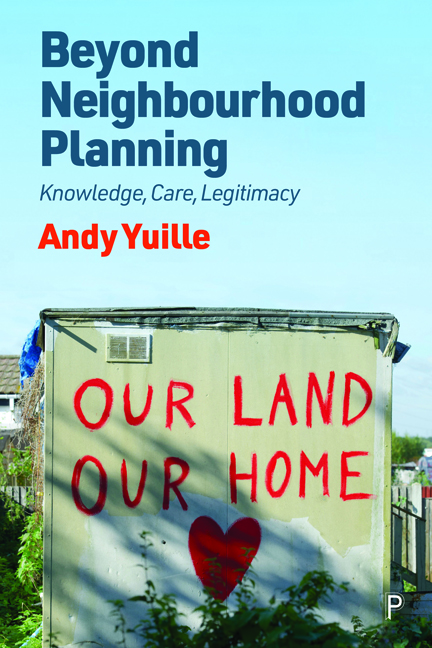Book contents
- Frontmatter
- Contents
- List of figures and table
- Acknowledgements
- Preface
- 1 Introduction: Neighbourhood planners and the turn to participation
- 2 Planning, participation and democratisation
- 3 Knowledge, politics and care: perspectives from Science and Technology Studies
- 4 Neighbourhoods, identity and legitimacy
- 5 Experience, evidence and examination
- 6 Expertise, agency and power
- 7 Care and concern
- 8 Conclusion: Neighbourhood planning and beyond
- Notes
- References
- Index
6 - Expertise, agency and power
Published online by Cambridge University Press: 20 January 2024
- Frontmatter
- Contents
- List of figures and table
- Acknowledgements
- Preface
- 1 Introduction: Neighbourhood planners and the turn to participation
- 2 Planning, participation and democratisation
- 3 Knowledge, politics and care: perspectives from Science and Technology Studies
- 4 Neighbourhoods, identity and legitimacy
- 5 Experience, evidence and examination
- 6 Expertise, agency and power
- 7 Care and concern
- 8 Conclusion: Neighbourhood planning and beyond
- Notes
- References
- Index
Summary
This will lead to a fundamental and long overdue rebalancing of power, away from the centre and back into the hands of local people … as planning shifts away from being an issue principally for ‘insiders’ to one where communities take the lead in shaping their own surroundings.
The Conservative Party (2010: 2)Introduction
As exemplified by the opening quotation from Open Source Planning, the Conservative Party Green Paper that formally established the concept of neighbourhood planning, this was promoted as an initiative to transfer power from state to communities. In this chapter I further problematise this characterisation. In Chapter 4 I distinguished neighbourhood planning groups (NPGs) from their neighbourhoods, and described them as enactments of three distinct identities in relation to those neighbourhoods. In Chapter 5 I reviewed one of the key processes through which those identities are enacted, and by which one specific identity comes to dominate the representations produced and performed by the NPG. In this chapter I explore the effects that these enactments have on relations of power. I consider power here not as something that is held (and can therefore be straightforwardly transferred) but as something that is done. And it is done collectively, enacted not by individuals or institutions acting alone, but by the particular configuration of the social and material, human and non-human elements of neighbourhood planning assemblages.
In this chapter I suggest that the creation of the two new actors – the neighbourhood and the NPG – disrupts existing patterns of relations. I show how this disruption enables the NPGs to have effects on policy and decision making that would not otherwise have been possible. However, I then go on to show that the same processes that enable this disruption also reproduce the category of ‘the expert’ and the ‘expert– agency coupling’, which restricts the ability to have effects to those enacted as having expertise. While the NPGs are partially able to inhabit the figure of the expert, they are also decentred from it by accredited professionals in a variety of ways. As the power to act is manifested through the capacity to be enacted as expert, the NPGs are heavily constrained as well as enabled by the disruptions of neighbourhood planning.
- Type
- Chapter
- Information
- Beyond Neighbourhood PlanningKnowledge, Care, Legitimacy, pp. 164 - 200Publisher: Bristol University PressPrint publication year: 2023

